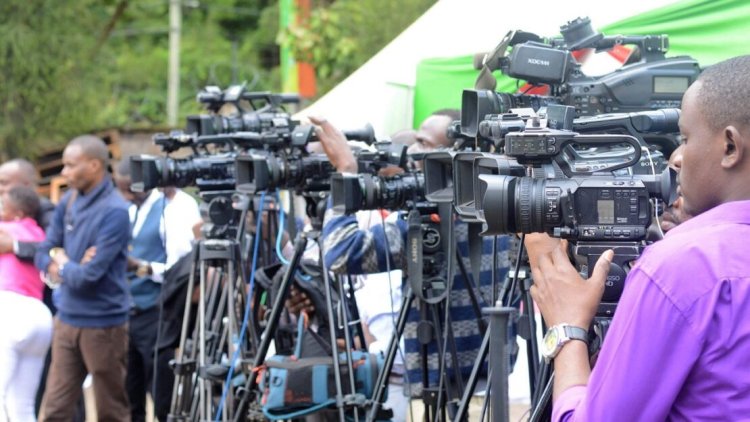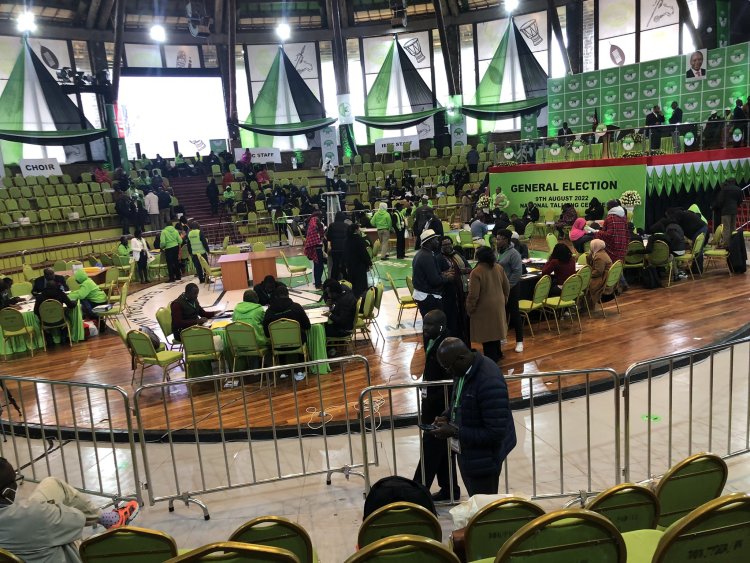Media Council: Journalists Trolled Online During August Elections
This is despite notable adherence to the Constitution of Kenya regulations on the freedom of expression as well as media freedoms during that period.

The Media Council of Kenya (MCK) has revealed how some of at least 43 journalists harassed during the just-concluded August 9 general elections were subject to online attacks.
In its report titled Media Performance & Press Freedom Violations Pre, During & Post the August 9 General Election in Kenya, MCK noted that the government's decision not to block internet access during the electioneering period rendered some digital journalists vulnerable to online harassment.
This is despite notable adherence to the Constitution of Kenya regulations on the freedom of expression as well as media freedoms during that period.

Kenyan journalists covering a press conference at a past event. /KUJ
"There was no effort by the Government to close or restrict the use of the Internet during the period. Thus, citizens continued accessing electoral information through the Internet including election results.
"There was notable adherence to the constitutional provisions on freedom of expression, media freedom and access to information as provided for in Articles 33,34 and 35," the report noted in part.
The media regulator noted that other forms of harassment other than online included profiling of journalists and physical attacks in some cases, which included them being blocked from accessing their designated polling and tallying centres.
Other cases listed in the majority of them reported included threats and arrests.
"Unfortunately, MCK also observed increased cases of press freedom violations including denial to access voting areas, critical information from relevant public bodies, profiling of journalists and media outlets, online trolling of journalists and media outlets and in some cases physical attacks on journalists. At least 43 journalists from various media houses were affected by various forms of harassment in 12 incidences documented by the Council.
"Majority of these (37) were involved in incidences that denied them an opportunity to easily access their designated polling and tallying centres while the others included arrest, threats and harassment," it added.
MCK called on the police and other agencies to expedite investigations and bring the culprits to book.
Additionally, the Council observed gaps in support for journalists based in the counties by their employers. These included unavailability of reliable transport, meals and other general issues of welfare, but MCK was able to deploy resources available to assist those that sought assistance.
As part of the preparation and support to the media, the Independent Electoral and Boundaries Commission (IEBC) accredited over 11,000 local and international journalists and media practitioners to cover the elections across the country.
The Council collaborated with IEBC to ensure journalists were facilitated with MCK accreditation and IEBC cards to access polling and tallying centres across the country and through this, the members of the Fourth Estate were able to access their designated areas of work using the cards.
At the national tallying centre, at the Bomas of Kenya, the Commission set up a media centre which hosted an average of 200 journalists daily and was well equipped to ensure comfort and effective delivery.
Journalists were also able to access the main tallying auditorium, from where the Commission was announcing the tallied and verified results.
The Council, individually and through partnerships, invested in ensuring that media coverage of the 2022 General Election was not only professional and responsible but fair, accurate comprehensive and informative; and provided a balanced and adequate opportunity for citizens, candidates and political parties to express divergent political opinions.
It also monitored the fairness and credibility of the electoral process contributing positively to the peaceful conduct of elections. The Council had a presence online, across the country and deployed various tools and approaches to content analysis as well as media monitoring.

Ongoing verification process at the Bomas of Kenya. /MARTIN WACHIRA.TWITTER

 admin
admin 




